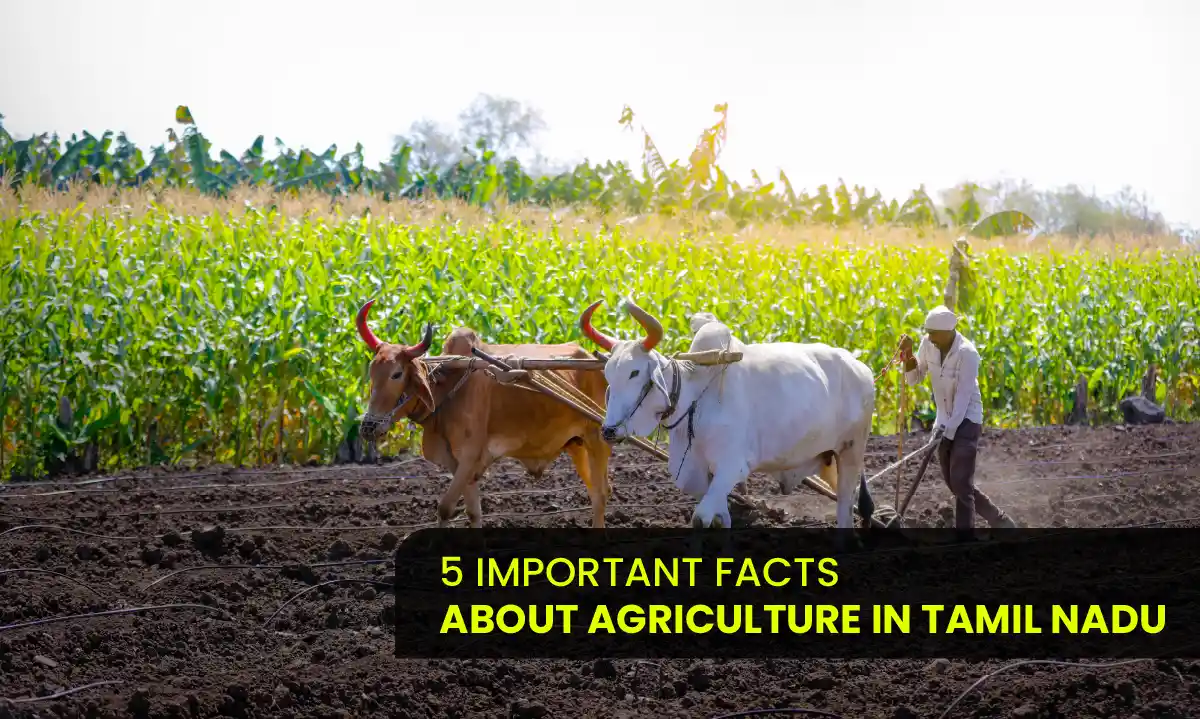Five Essential Points on Tamil Nadu's Agricultural Industry

Introduction
Agriculture in Tamil Nadu is a vital part of the state's economy and cultural heritage. With its diverse crop cultivation, significant contribution to employment, and adoption of sustainable practices, the agricultural sector supports rural livelihoods and food security. As the state continues to embrace technological advancements and sustainable methods, agriculture in Tamil Nadu is composed of continued growth and resilience, ensuring prosperity for future generations. The five most significant facts of Tamil Nadu's agricultural sector are covered in this blog.
Key Role of Tamil Nadu's Economy
Economic Contribution: Agriculture significantly boosts Tamil Nadu's economy by generating income and economic stability, particularly in rural areas where farming is a primary livelihood. Employment Generation: The agricultural sector in Tamil Nadu is a major source of employment, providing jobs to a large portion of the state's population, including farmers, farm laborers, and workers in allied sectors such as transportation and marketing.
Food Security and Cultural Importance: Agriculture plays an essential role in ensuring food security by producing a diverse array of crops essential for local consumption. It also preserves Tamil Nadu's cultural heritage through traditional farming practices, influencing festivals, social customs, and community identity.
65% of women farmers in Tamil Nadu
In Tamil Nadu, women play an important role in agriculture, constituting a significant majority of the farming workforce. This statistic highlights the integral contribution of women to the state's agricultural sector, where they are actively involved in various farming activities, from sowing and harvesting to managing livestock and post-harvest operations. Women farmers in Tamil Nadu not only contribute to household food security, but they also play a pivotal role in rural economies by generating income and supporting family livelihoods. Their involvement spans across diverse agricultural practices, including traditional and modern farming techniques. Many women farmers are also involved in horticulture, floriculture, and dairy farming, leveraging their skills to cultivate a wide range of crops and manage livestock efficiently.
Despite facing challenges such as limited access to resources and land ownership, women farmers in Tamil Nadu demonstrate innovation in agricultural practices. Government initiatives and support programs aimed at empowering women in agriculture, providing training, access to credit, and technology adoption further enhance their productivity and economic independence.
Top Grain for Human Consumption
Wheat stands out as the top grain consumed directly by humans globally, playing a vital role in diets. This versatile grain is renowned for its nutritional value, providing essential nutrients such as carbohydrates, proteins, fiber, vitamins (especially B vitamins), and minerals like iron and magnesium. People consume wheat in various forms, such as bread, pasta, noodles, and breakfast cereals, making it a staple in diets across cultures and regions. The availability, affordability, and ease of processing into a variety of food products contribute to its widespread popularity.
From a historical and cultural perspective, wheat has been a fundamental part of human diets for millennia, dating back to ancient civilizations. Its cultivation and consumption have had a global impact on agricultural practices and food traditions. Economically, wheat cultivation and trade contribute significantly to agricultural economies and food security. Production is important for meeting global food demand, particularly in regions where it serves as a primary calorie source.
Status of organic farming in Tamil Nadu
Currently, organic farming in Tamil Nadu covers approximately 7.61% of the total agricultural area in the state. This percentage reflects a growing trend towards sustainable agricultural practices that prioritize soil health, biodiversity conservation, and consumer health. Organic farming in Tamil Nadu involves cultivating crops without synthetic pesticides or fertilizers, instead relying on natural methods like composting, crop rotation, and biological pest control.
The status of organic farming in Tamil Nadu highlights efforts to reduce chemical inputs, promote environmental sustainability, and produce healthier food options. Despite challenges such as initial transition costs and market access, the sector shows promise in enhancing soil fertility, preserving natural resources, and supporting rural livelihoods.
High-Tech Farmers in Tamil Nadu
High-tech farmers in Tamil Nadu represent a growing trend towards the adoption of modern agricultural technologies and practices aimed at enhancing productivity, efficiency, and sustainability. These farmers leverage advanced tools and techniques, such as precision agriculture, drone technology, soil sensors, and automated irrigation systems, to optimize crop management. In Tamil Nadu, high-tech farming practices enable farmers to make data-driven decisions regarding planting, irrigation, fertilization, and pest control. For example, precision agriculture uses GPS and satellite imagery to monitor field conditions, leading to more precise application of inputs and reduced resource waste.
Automated irrigation systems ensure timely and efficient water usage, which is important in a region prone to water scarcity. The adoption of high-tech farming not only improves yield and quality but also enhances resilience against climate change and variability. Farmers can mitigate the risks associated with weather fluctuations and pest outbreaks through early detection and proactive management using technology-driven solutions.
Conclusion
In conclusion, agriculture in Tamil Nadu plays an important role in driving the state's economy, providing employment, and ensuring food security. The state's diverse crop cultivation, rich agricultural traditions, and increasing adoption of sustainable practices highlight its importance. As Tamil Nadu continues to embrace modern technologies and sustainable farming methods, its agricultural sector is set to thrive, supporting both rural communities and overall economic growth. So these are the 5 important facts about agriculture in Tamil Nadu.
Latest blogs
JOIN OUR COMMUNITY !
Stay connected with Getfarms! Follow us on social media for the latest updates, exclusive offers, and a glimpse into the world of farmhouse living. Join our community today




























